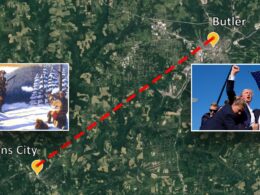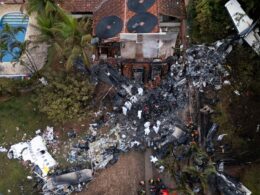A former long-haul trucker awaiting trial in the 1992 murder of a North Carolina woman was charged in the suspected serial killings of three more women in California more than four decades ago, authorities said Thursday.
Warren Luther Alexander, 73, was charged with three counts of murder in connection with the 1977 strangulation deaths of Kimberly Fritz, 18; Velvet Sanchez, 31; and Lorraine Rodriguez, 21, law enforcement officials said at a news conference in Ventura County.
The women, all sex workers, were found dead in Port Hueneme, Oxnard and an unincorporated part of Ventura County, respectively, in May, September and December of that year, officials said.

Alexander, who is being held without bail at a Ventura County jail, was extradited earlier this week from North Carolina, where he was charged with murder two years ago in the strangulation death of Nona Cobb, Ventura County District Attorney Erik Nasarenko told reporters.
Cobb, 29, was found dead on an interstate northwest of Winston-Salem on July 7, 1992, according to the North Carolina State Bureau of Investigation.
Her autopsy showed that she had been strangled, according to NBC affiliate WXII-TV of Winston-Salem.

Alexander was arrested in connection with the killing on March 15, 2022, in Diamondhead, Mississippi, the bureau said in a news release at the time.
Court records for Alexander’s case in North Carolina were unavailable Friday night and it isn’t clear if he has entered a plea or who is defending him.
Alexander is scheduled to be arraigned on the California charges on Aug. 21, court records show. A lawyer for Alexander did not respond to a request for comment Friday night.
Nasarenko said authorities in North Carolina used genetic genealogy, a technique that matches DNA obtained from crime scenes and elsewhere to profiles assembled by genetic testing companies, to link Alexander with Cobb’s killing.
After Alexander’s 2022 arrest, his DNA was uploaded to a nationwide law enforcement database and authorities in Ventura County were alerted to the case, Nasarenko said.
In 2006, investigators in the county had uploaded DNA preserved from the 1977 crime scenes to the same database, Nasarenko said, but it wasn’t until after Alexander’s arrest that his DNA entered the database and there was a match.
“Today marks the first crucial step toward achieving long-awaited justice,” the prosecutor said.
Alexander lived in Oxnard, roughly 60 miles northwest of Los Angeles, in the 1950s and 1960s while attending school, Nasarenko said. He returned there in the 1970s and worked as a long haul-trucker for the next three decades, the district attorney added.
Detectives who investigated the cases initially suspected the same suspect was responsible for the series of killings, he said, but they exhausted their leads and the cases went cold.
Authorities are now working with the Federal Bureau of Investigation through its Highway Serial Killings Initiative to help identify other potential victims linked to Alexander, Nasarenko said.
Authorities believe there may be others locally and in other states, he said.
“This is not in any way closed,” Nasarenko said.
,







